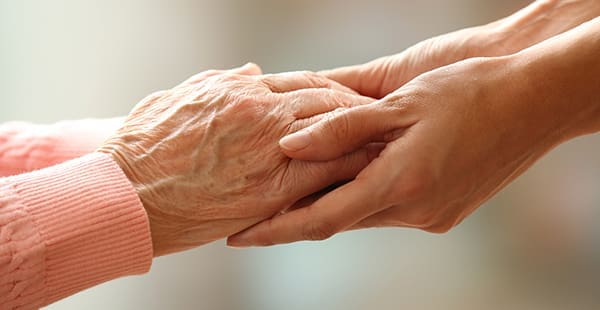What Is a Mesothelioma Caregiver?
A mesothelioma caregiver is a person who helps a cancer patient with various types of tasks as they undergo mesothelioma treatments. Many cancer symptoms and treatment side effects can make it difficult for a patient to keep up with chores. Balancing medical appointments and medication can also be challenging. The caregiver typically takes over some or all of these tasks, so the patient can focus on their well-being.
Who Can Be a Mesothelioma Caregiver?
Anyone can be a mesothelioma caregiver, but in this sense, it’s not a healthcare professional. A caregiver does not get paid or receive formal training. Instead, a caregiver is someone close to the cancer patient who chooses to help. The caregiver often works closely with the medical team on behalf of the patient. Some mesothelioma patients may have more than one caregiver.
Often, the people who step into this role are:
- Adult children
- Fellow church parishioners
- Friends
- Neighbors
- Parents
- Siblings
- Spouses or partners
Resources for Mesothelioma Patients
First Steps for a Mesothelioma Caregiver
Becoming a mesothelioma caregiver begins after a diagnosis. Mesothelioma is a serious illness, and its treatments are physically demanding. Patients can benefit from the support of trained medical professionals, along with family and friends.
As a loved one, hearing about a mesothelioma diagnosis may feel overwhelming. The news may bring shock, sadness, anxiety, fear, denial and so many other feelings. Even through these difficult emotions, many people take the step of choosing to become a cancer caregiver.
Next, a mesothelioma caregiver and the patient begin planning. They can identify what the caregiver could take over for the patient, such as laundry and dishes. A caregiver may take on scheduling appointments and keeping friends and family updated.
A caregiver may also want to learn about the patient’s condition. They may want to research the disease, symptoms, treatments and side effects. Knowing this information can give the patient and caregiver an idea of what to expect. Many factors go into each patient’s cancer journey, but the medical team can help with getting the research started.
Understanding a Loved One’s Mesothelioma Diagnosis
Caregivers may find understanding the mesothelioma diagnosis helps with uncertainty. But many factors influence a diagnosis and can affect a patient’s prognosis.
Some factors affecting the prognosis may be the patient’s age, the mesothelioma stage and where the cancer started. It’s important to remember that every patient’s case will be different.
The doctor may carefully explain different aspects of the disease. They may also discuss treatment options and the patient’s life expectancy. A role of the caregiver is to advocate for the patient and make sure they understand what the doctor is saying.
Patients and caregivers may have many questions about the diagnosis. You should feel comfortable asking as many questions as you can think of. By going to appointments with a list of questions, caregivers can have a reminder of things to ask.
Symptoms and Treatment
Mesothelioma has common symptoms that patients may experience. Caregivers may want to know what they are so they can take note if the symptoms happen. Remember, not all patients experience the same symptoms.
Common symptoms include:
- Abdominal pain
- Chest pain
- Coughing or wheezing
- Difficulty breathing (dyspnea)
- Fatigue and muscle weakness
- Fever and night sweats
- Fluid buildup
- Loss of appetite
- Unexplained weight loss
Some treatments may also be common between mesothelioma types and stages. Doctors will tailor the treatment plan to the patient. Not all treatment options work the same for the different types of mesothelioma.
Some common treatment options include:
Patients often get a combination of these treatments. Palliative care also benefits many patients.
Physical and Emotional Changes
Caregivers may also need to prepare for physical and emotional changes in the patient. These may be surprising and difficult to accept, and some may only happen with certain treatments. Patients and caregivers should tell the healthcare team if these changes happen. The care team may also be able to offer solutions.
Some physical changes that patients may experience include:
- Bone loss (osteoporosis)
- Changes to hair, nails and skin
- Eye problems
- Hair loss
- Heart problems
- Loss of strength
- Scars from surgery
- Weight loss
Some common emotional changes may include:
- Anger
- Anxiety
- Depression
- Fear
- Guilt
- Loneliness
- Stress
- Worry
Creating the Right Care Plan
The healthcare team develops a treatment plan based on the patient’s needs. Part of that treatment plan may include care at home rather than in the hospital. This type of care provides a familiar setting that may help with healing. Because some treatment happens at home, the caregiver becomes an important partner.
Family caregivers often work with medical care teams from the start. As a team, they will decide what the caregiver can do for the patient at home. The caregiver’s work is meant to help improve the patient’s quality of life. This can include making sure the patient gets balanced nutrition and mild exercise.
What to Expect As a Mesothelioma Caregiver
Once treatment starts, a caregiver can expect to take on many different roles. This is when caregiving becomes more functional. Some caregivers may feel like there is a lot to do, and experts acknowledge this. They have tips that can help, and the healthcare team may recommend other solutions, like respite care.
Common Tasks of a Mesothelioma Caregiver
Mesothelioma caregivers take on important jobs, like talking with the care team and watching the patient for any changes to their condition. While these are common, it’s important to remember that each patient will have unique needs.
Some other cancer caregiver tasks include:
- Basic medical care, like giving medicines
- Helping with daily tasks, like household chores or grooming
- Providing emotional and mental support, like being a good listener
It’s also important for the caregiver and the patient to have good communication with each other. Good communication can help the patient and caregiver make sure everything is working for both of them.
Providing Daily and Medical Support
When in active treatment, patients may not feel up to routine tasks. But caregivers can provide daily care and support. Caregivers do many things to help mesothelioma patients. They may:
- Change soiled sheets and wash the laundry
- Communicate with the care team
- Help with daily hygiene
- Manage appointment scheduling and transportation
- Manage medications
- Prepare meals and shop for groceries
- Take care of children and pets
While caring for a mesothelioma patient, caregivers also need to keep their safety in mind. For example, chemotherapy requires extra precautions when handling patient laundry. Experts have tips to help caregivers with this task. The care team may also have suggestions.
You can read other tips at these links:
- 7 Tips on Caregiving for a Bedridden Loved One
- 7 Tips to Stay Healthy as a Caregiver
- Cancer-Fighting Foods for Mesothelioma Cancer Patients
- Caring for Mesothelioma Patients Before and After Surgery
- How Support Groups Help Cancer Patients and Caregivers
- Key Tips and Precautions for Living With Someone on Chemo
Supporting Emotional and Mental Well-Being
Throughout their cancer journey, patients need emotional support. They may also need help maintaining their mood and mental health. Experts note that strong personal connections aid cancer patients in adjusting to their diagnosis. Cancer patients tend to have a better quality of life and more positive outlook when they have strong ties to loved ones.
Caregivers can help by talking to the patient or simply listening to them. When family and friends cannot be there every day, the patient may enjoy a phone call or a letter. Caregivers can also encourage:
- Being as active as possible
- Finding ways to help the patient relax, like listening to music
- Focusing on hobbies or things that bring joy
Ultimately, caregivers are invaluable to cancer patients. Navigating a cancer diagnosis can be emotionally daunting. But caregivers’ strength, support and compassion make a real difference.
The Impact of a Mesothelioma Diagnosis on Caregivers
Caregivers may have many emotions after hearing about a loved one’s mesothelioma diagnosis. They may feel down or overwhelmed and might worry about the future. It’s important to recognize these feelings and get help for them when needed.
For some, mesothelioma caregiving may be rewarding. Taking care of a loved one may show inner strength, boost confidence and bring families closer together. Some caregivers feel a sense of pride and new meaning.
Whether you feel overwhelmed or filled with purpose, your experience is valid. And if you struggle with difficult emotions, options are available to help. The care team can offer suggestions and make referrals.
Recognizing Mesothelioma Caregiver Burnout
Caregivers spend a lot of time helping the cancer patient. The stress of it can build up and lead to caregiver burnout. This feeling is a physical, emotional or mental exhaustion. If it is not managed, it may lead to physical symptoms, depression and anxiety.
Recognizing burnout may help manage its severity. Some signs of caregiver burnout include feeling frustrated, helpless, angry, alone and withdrawn. Caregivers may also have trouble sleeping and may experience weight changes.
Experts suggest that awareness may help caregivers reduce the impact of burnout. They suggest paying attention to how you feel and asking for help when you need it. Experts also recommend self-care practices to ease some of the symptoms.
Self-Care Strategies for Mesothelioma Caregivers
Experts suggest caregivers practice self-care to avoid or address burnout. Self-care means focusing on one’s own well-being, like maintaining personal physical and mental health. Without practicing self-care, a caregiver may suffer long-lasting effects.
Some caregivers may worry that this is selfish, but it’s not. Experts note it makes taking care of others easier. It gives the caregiver the energy to take care of a mesothelioma patient. Self-care can also be easy.
Caregivers can focus on some key aspects of self-care to help keep themselves rested, such as asking for help, practicing mindfulness and managing stress.
Help for Mesothelioma Caregivers
Help is available for mesothelioma caregivers, and there is no shame in using any of it. Self-care helps, but even the best self-care tips might not be as effective as organized help.
A cancer support group puts you in touch with other people going through the same thing. You can share your story and hear how others deal with similar issues. One-on-one therapy can provide an outlet for your emotions.
There are also services that help with caregiving tasks. Home health care or respite care gives the caregiver a break by letting an assistant take over care. Caregivers can also hire a maid service to help with daily chores. And transportation services can take the patient to appointments.
Importantly, the cancer care team may be able to offer a variety of solutions. Often, the care navigator or a social worker will have resources to help you. Managing mesothelioma may require resilience, but patients and caregivers are not alone.
Common Questions About Mesothelioma Caregiver Duties
- What challenges do mesothelioma cancer caregivers face?
Mesothelioma caregivers may face many possible challenges, like:
- Decreased quality of life
- Feeling overwhelmed
- Frustration
- Grief over the expected loss of life or the patient’s illness
- Sadness
- Sleep problems
- Stress
- Work-related challenges, like missing work or having to retire early
Support for caregivers can help navigate these hurdles.
- How can I take care of patients with cancer?
A caregiver takes care of the cancer patient before, during and after treatment. The cancer care team and caregiver work together to decide what duties can be done at home, like:
- Communicating with the cancer care team
- Helping with insurance and finances
- Household chores
- Managing medications
- Scheduling appointments and taking the patient to them
Remember, every patient is different and will have different needs.










